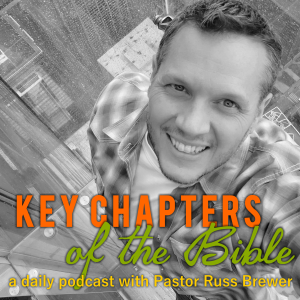
2/15 Leviticus 16** - Yom Kippur - The Day of Atonement
 2023-02-15
2023-02-15
Leviticus 16 is one of the most important chapters in the Old Testament because it tells us how a person is made holy enough to be in God's holy presence. Today in our study of Leviticus 16, we'll explain the details to see how they ultimately point to Jesus Christ. Join us!
DISCUSSION AND STUDY QUESTIONS:
1. The podcast asserted that Leviticus 16 is the most important chapter in the book of Leviticus, and one of the most important chapters in the entire Bible. Why did the podcast suggest this?
2. The podcast mentioned that Leviticus 16 answers the question: “How can a sinful person come into the presence of a holy God?” Why does God require holiness of everyone and everything that comes into His presence? The podcast gave two of the most common ways people answer that question; what were they?
3. Think back to what we’ve learned over the last couple of weeks, what specific place signified God’s presence in ancient Israel? Who went into His presence? How often?
4. In verse 3, on the Day of Atonement (the Yom Kippur) the High Priest would first bring an offering for himself. Why was this necessary? How does this help us understand the principle taught in the New Testament that there is only one mediator between God and man?
5. Overall, how many animals were sacrificed on the Day of Atonement? Which ones and for whom?
6. In verse 4, what was the High Priest supposed to wear on the Day of Atonement? What did this signify? How does this foreshadow Christ’s work as our High Priest?
7. In verse 8, what were the two goats for? How was their role decided? How do the two goats teach the principle of justice being meted out for sin and also for the removal of sin?
8. In verse 12, where was Aaron to bring the fire pan? What did this symbolize? What is the significance of this item now coming into the presence of God?
9. In verse 15, where did Aaron bring the blood of the goat that was offered to the Lord by way of sacrifice? Where did he sprinkle it?
10. In verse 21, what would Aaron do with the scapegoat? What did this point to?
11. In verses 29 and 31, what were the people supposed to do while all this was happening? What does this mean? How did this give the people a role in the Day of Atonement? How does this show us that each person has a personal responsibility to have their sins dealt with?
12. The podcast mentioned that Leviticus 23:29 says that if a person would not humble their heart and soul before the Lord, they ought to be cut off from the people of God. Why?
13. Ultimately, this all points to Jesus. How was Jesus our final Yom Kippur? Do we still need to humble our heart and soul to the Lord? Why?
More Episodes
 2023-10-20
2023-10-20
 2023-10-19
2023-10-19
 2023-10-16
2023-10-16
 2023-10-11
2023-10-11
 2023-10-11
2023-10-11
Create your
podcast in
minutes
- Full-featured podcast site
- Unlimited storage and bandwidth
- Comprehensive podcast stats
- Distribute to Apple Podcasts, Spotify, and more
- Make money with your podcast
It is Free
- Privacy Policy
- Cookie Policy
- Terms of Use
- Consent Preferences
- Copyright © 2015-2024 Podbean.com




